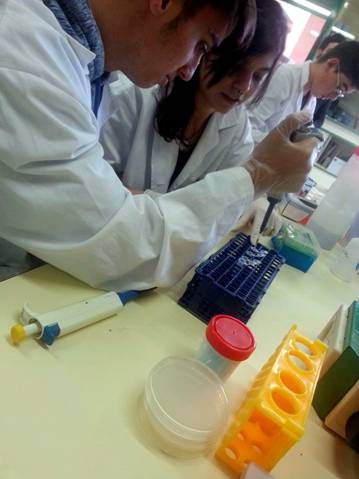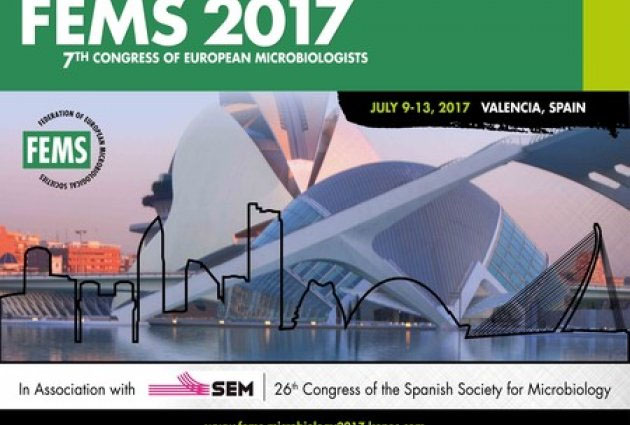SWI@Spain, A Timeline: Spreading Passion for Discovery
/by Victor J. Cid, Universidad Complutense de Madrid
Dr. Victor J. Cid leads SWI@Spain, the Small World Initiative's efforts in Spain. Dr. Cid joined the Small World Initiative two years ago and attended the June 2016 training held at the University of Connecticut. Since then, he has been rapidly growing the program in Spain and has already impact 42 postsecondary institutions and high schools across the country. His team at the Universidad de Complutense de Madrid has been working to translate the Small World Initiative: Student Research Guide and Research Protocols into Spanish. In this post, Dr. Cid shares his experiences starting and growing SWI@Spain.
June 2016, SWIPI Training Course, University of Connecticut, USA
Great ice cream on Campus and a great bunch of people sums up the SWIPIs training experience. We were taught by the safe and steady hands of Nichole and Debra. Everything works, everything seems easy. This is America, a land of opportunities. Trump for President? Ha, ha, who buys that joke! The Small World Initiative is as contagious as it is exciting. A Spaniard among the trainees. Well, that’s me. Back home a small grant from Madrid University is waiting for a pioneering SWI experience through the 2016-17 course. My friend Caroline Jérôme had told me all about service-learning before flying to the States. We thought that only by adapting SWI to service-learning we would be able to meet the aim of waking up STEM vocations in Spain, where the decision of jumping on the science path is made during high school, well before college. We planned to have teams of university students become SWI Teaching Assistants (SWITAs) in charge of coordinating SWI at high schools. An ambitious plan. Cool, though.
October 2016, SWI Faculty Training, Faculty of Pharmacy, Complutense University of Madrid (UCM), Spain
Time to plan out SWI@Spain. Nineteen Faculty Members from Pharmacy, Veterinary and Biological Sciences are taking a short training workshop and debating on how to deal with the challenge. Professors, Senior Researchers and younger Postdoc fellows: everyone is so excited about the project! They must contact high schools and recruit SWITAs among their third year university students. Will anyone be interested after all? Hectic days: launching our Facebook, blog and webpage, spending all our budget in culture media, disposable gloves and labcoats, cycloheximide, Petri dishes and toothpicks, to name a few shopping items.
November 2016, SWITAs Training Courses, Faculties of Pharmacy and Biology, UCM, Madrid, Spain
Overwhelmed by success among our students: 120 SWITAs have enrolled. Third year pharmacy and veterinary students, second year biologists and biochemists, even some master in microbiology students. They are already undergoing training courses in the lab, extra microbiology lab classes: digging for samples around the campus, making dilutions, recognizing different colonies, dealing with isolates and making the antibiosis assays on two ESKAPE dummies: one gram-negative and one gram-positive. That is as far as we can reach. They must master the techniques as they will be responsible for teaching much younger SWI students. The environment is great, and it is antibiotic awareness week! The world famous “They won’t survive” videoclip was shot by Belen Patiño’s students in these training sessions. The response from high schools is no less encouraging. Dozens of schools have applied. We decide to work with 22 of them. It is crazy, I know, we are taking as much as we can afford and that is the absolute maximum.
December 2016, High School “Margarita Salas”, Majadahonda, Madrid, Spain
Professor Covadonga Vázquez and her SWITAs are pioneering the experience in a public high school in a Madrid suburb. They are science students from an excellent program. Samples are taken form soil all over Spain. So much to do in just five two-hour sessions in the high school labs! The SWI team is busy carrying material, pipettes, cultures, and all kind of gear from the university to the high school and back. The rest of SWI@Spain team members are following their experience closely. After Christmas, the other 21 High Schools will be hosting SWI at some point.
February 2017, High School Gonzalo Torrente Ballester, San Sebastián de los Reyes, Madrid, Spain
It is our fifth visit, and we are bringing the smelly antibiosis assays from the university incubators in a biosafety-marked container in the trunk of my car. SWITAs are struck by waking up so early, but the kids are in eureka mood: Look! I have a producer! It beautifully inhibits Staphylococcus. That’s nothing! I have three! Excitement is in the air, although some of the kids are down because they got nothing. That’s how science works! These students don’t know yet that two months later they will win their school prize in sciences for their presentation on their SWI experience. Back at the University, we have quite a mess sharing common materials as some visits to high schools by different SWI teams overlap in time. At some point, we were working with 6 different high schools during the same week. I had to make a schedule to make sure that the automatic pipettes, vortex, alcohol sprays, etc., etc., were available for everyone. Please bring back the pipettes before noon or I am doomed!
March 2017, High School Carpetania, Yepes, Toledo, Spain
This is the farthest spot SWI is reaching! We were in El Escorial, Aranjuez. We are now bringing the cultures and material from the Complutense campus in Central Madrid to a small town outside the Madrid region. Only the most devoted SWITAs accepted to work that far. But there is a surprise: Julia and her team are with us. They are senior journalism students and producing a professional documentary movie on antimicrobial resistance for their graduation thesis. The SWI students here are equally attracted by audiovisual production and antibiotic discovery. Julia and her team are undoubtedly contributing to communicating our effort and our message and hold a successful premiére in November!
April 2017, Auditorium, Faculty of Pharmacy, UCM, Madrid
It is time to celebrate. Prizes and certificates are ready. Everyone is here for the SWI closing ceremony. And we have a lot to celebrate: we have implemented the most ambitious service-learning innovation project at our university ever, we have visited 22 High Schools where 500 SWI young researchers analyzed over 250 samples of soil. We have collected their surveys, and we can conclude that SWI has indeed fulfilled its goal of involving them in real science. They also understand the AMR topic much better, and they are taking the message home. Moreover, active service-learning did work too. Our 120 SWITAs are also happy with the experience. The bravest among them presented a total of 8 SWI communications and posters at the Undergrad Research Congress the week before, and they and were awarded two prizes. We have now found several dozens of antibiotic-producing candidate bacteria from diverse Spanish soils in our fridges. We have no budget yet to properly identify them, and our star keynote speaker, Fernando Peláez, thinks that finding a new antibiotic in the soil “is like finding a particular needle in a box with millions of needles.” But still, the human value of our experience in building this national branch of the SWI community makes it all worthwhile today. Fernando was in the team that developed echinocandins from a fungus isolated in the Lozoya valley, near Madrid. His talk is highly motivating. If I was a 30-year-younger fellow in this audience, I would want to become a scientist overnight. Moreover, coordinating SWI@Spain makes me proud of having taken that decision, whatever my inspiration was at the time.
May 2017, Reflections, Pozuelo de Alarcón, Madrid
What now? Feeling like a victorious soldier after the battle, I guess. Proud of my fellow SWIPIs and my little army of SWITAs. Such heroic fighters all of them! But is the war won?? Nope! Neither the one against our politicians' blindness towards science nor the one against superbugs, sadly. So we should be standing for the next battle. We will be at the Scientific Weekend at the National Science and Technology Museum (MUNCYT) later this month. We will also be present at education service-learning oriented meetings. And, more importantly, we will share our experience with European colleagues at the Education Symposium at the FEMS Congress in Valencia next July (thanks Dr. Nichole Broderick for accepting our invitation to the carry the SWI flag at this meeting). But our next strategic plan is to conquer the Iberian Peninsula. Exciting. Now I know how Napoleon felt. I just hope we will be luckier than he was in this enterprise. The plan is to hold a SWIPI training workshop in Madrid parallel to the one at the University of Connecticut. SWIPIs-to-be have applied from Catalonia, Navarra, Aragon, the Basque Country, Cantabria, Asturias, Galicia, both Castilias, Extremadura, Andalusia and Valencia. Merck, Sharp & Dome Spain has offered sponsorship for the workshop, Biomerieux will provide some culture media for free, and if the National Strategic Programme for Antibiotic Resistance is sensitive enough, they should cooperate too. Daydreaming maybe, nothing final. Hold on for a report on the next battle. Pipettes are loaded.



















